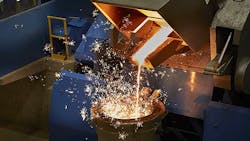Brembo’s Global Expansion Continues with Michigan Iron Foundry
Automotive brake manufacturer Brembo SpA reported success in the first pouring of gray iron at its greenfield foundry in Homer, MI, a 266,000-sq.ft project announced in 2014. With an estimated capacity of 80,000 tons/year of brake discs, the plant was described by the group’s deputy executive chairman as part of a vertical integration strategy, and “further proof of Brembo’s commitment to Michigan and is a key component of Brembo’s continued global expansion."
Brembo specializes in disc brakes for automotive vehicles, including passenger cars, commercial vehicles, and motorbikes, as well as clutches and other components for racing vehicles.
Although the Michigan foundry was described at the outset as $100-million project, in a conference call to discuss the initial pour Matteo Tiraboschi indicated the cost was somewhat higher.
“The growth of our Homer operation exemplifies our commitment to the North American market, the top geographic market for Brembo worldwide,” according to Tiraboschi.
It is Brembo’s fourth brake disc foundry, following plants in Italy, Poland, and China. It is also developing an aluminum foundry in Mexico to produce brake calipers.
The Michigan foundry is adjacent to a 440,000-sq.ft. operation that finish-machines brake discs and drums for automotive OEMs. Brembo acquired the site in 2007 as part of its purchase of the Hayes Lemmerz brake business. It also operates a caliper and corner module assembly plant at that location.
Customers for Brembo’s brake products include Fiat Chrysler, Ford, General Motors, and Mercedes, according to corporate officials speaking about the first pour in a scheduled conference call.
They also acknowledged that the new foundry would not produce enough castings to fulfill its customers’ requirements, and that the brake business would continue to rely on other iron foundries to fulfill its orders.
The foundry is expected to achieve its full operating capacity by 2017, at which time it’s expected to employ 250 workers.
“Having our own dedicated foundry in the United States allows us to have maximum control over our process and costs,” commented Brembo North America president and CEO Dan Sandberg. “Our customers benefit by having a dedicated, fully integrated manufacturing process for their brake components.”
About the Author
Robert Brooks
Content Director
Robert Brooks has been a business-to-business reporter, writer, editor, and columnist for more than 20 years, specializing in the primary metal and basic manufacturing industries. His work has covered a wide range of topics, including process technology, resource development, material selection, product design, workforce development, and industrial market strategies, among others.
